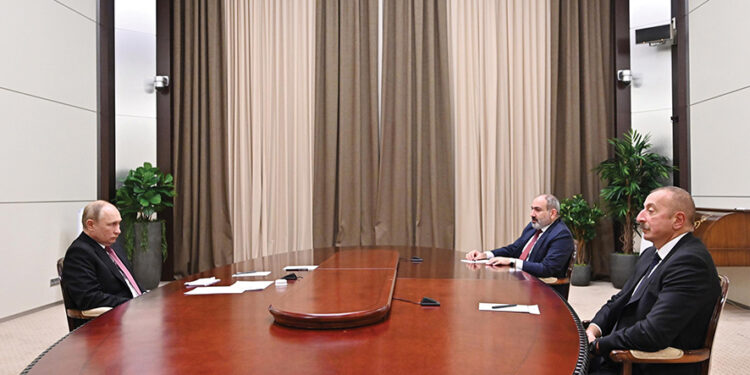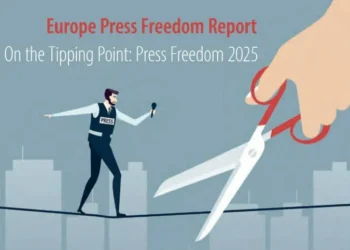Despite my enduring antipathy towards Ilham Aliyev, the main architect behind Azerbaijan’s swamp of dictatorship and corruption, I’ve admired him just as much as a grandmaster of foreign policy.
Aliyev outplayed not just Armenia’s foreign policy but Russia’s too, and it’s worth pausing on the latter to appreciate just how deftly he has pinned Putin to the mat (pun very much intended).
Historically, Azerbaijan’s collective memory is anti-Russian, while Armenia’s is the opposite. For nearly two decades, Aliyev built up the perfect image for Putin: a model post-Soviet strongman; a dictator who opens the gates wide for Russian language and culture at home. Joint press conferences would laud the “Russian House” operating smoothly in Azerbaijan, Russian schools flourishing by the hundreds, thousands of pupils enrolled, Baku hosting a branch of Lomonosov Moscow State University, and so on.
Meanwhile, the Armenians staged a democratic revolution, re-examined their foreign policy, dreamed of democracy, and began to curb the Russian language’s reach.
In 2020, Putin succumbed to the temptation to punish his historical ally, Armenia — or more precisely, its leader Pashinyan — with Aliyev’s hands. But he didn’t let Aliyev finish the job: he let Azerbaijan recapture the key city of Shusha, then called time on the war, so that the conflict would remain unresolved and Moscow could keep its grip as the region’s “mediator.” So long as Russia played mediator, Armenians and Azerbaijanis competed for its favor — the perfect balance for Moscow. But Putin upset this balance in 2020, hoping to alienate Armenia enough that its people would topple Pashinyan. That coup never came. Pashinyan proved resilient for a simple reason: the only alternative was Armenia’s old, pro-Russian, corruption-ridden elite that had ruled for two decades prior.
Armenia’s 2018 revolution was never really about foreign policy. Armenians didn’t crave a geopolitical shift — they simply wanted an end to the swamp of corruption and stagnation. Had Russia chosen pragmatism, backing that popular yearning for change, it could have kept both Karabakh and Armenia under its thumb. But Putin has never been able to approach revolution and democracy pragmatically. Instead, he backed Armenia’s most marginalized factions and “greenlighted” Aliyev on Karabakh, only to see Armenia’s politics tilt sharply anti-Russian.
Moscow never wanted Karabakh’s conflict resolved. But by 2023, bogged down in Ukraine, Russia no longer had the muscle to restrain Aliyev militarily. So Aliyev settled the conflict on his own terms.
Once that conflict ends, the need for Russian leverage in both Armenia and Azerbaijan drops to zero.
Pashinyan understood this, and chose his path: diplomacy to neutralize threats from Turkey and Azerbaijan, even at the cost of personal humiliation if needed. If he pulls that off, Armenia no longer needs Moscow as its security guarantor. It can pivot to Europe. Thankless, painful personally for him, but a pragmatic move. And for that, Pashinyan deserves real respect.
Yet normalization requires both sides. There was always a risk Aliyev might not want reconciliation — the Zangezur Corridor, fresh attempts to exploit Armenia’s weakness, the temptation to keep the old enemy narrative alive, as dictators always do. For now, Aliyev has dodged signing a peace deal, under a thousand pretexts.
Then Moscow stepped in, accidentally or not. A Russian missile brought down an Azerbaijani passenger plane. People died. There was no real Russian reaction — Putin mumbled an apology to Aliyev in private.
But in politics, private whispers mean nothing. Dozens died — there should have been mourning, lowered flags, compensation, a public word of sympathy, if not an outright apology. But Russia doesn’t treat its “natives” with such courtesy.
This was the moment Azerbaijan’s dormant anti-Russian DNA kicked back in — the same DNA Aliyev had kept tranquilized for two decades in the name of realpolitik. Now, with Moscow’s Karabakh leverage gone, Russians stuck in Ukraine and unapologetic over a downed plane, Aliyev made his move to show that he, too, is “one of the big boys,” especially after the Second Karabakh War. He shut down the “Russian House” — the cultural center of Moscow’s soft power, but did so under an anti-Western slogan to spare Moscow the humiliation and avoid provoking an immediate backlash. To keep up appearances, he also closed USAID offices — but the real story was the closure of Russian cultural hubs.
Putin reacted with his usual boorishness, unable to accept Aliyev’s sovereign move or Azerbaijan slipping out of the “Russian World.” Moscow’s response? FSB tactics: raid Azerbaijani diaspora leaders across Russian cities, humiliate them, film them, drag them into police vans. Two of them died. The plane downing wasn’t enough — now they came for ethnic Azeris inside Russia too.
Aliyev counterpunched: he detained the head of Sputnik Azerbaijan, roughed up a few Russian citizens, filmed it, broadcast it. The Kremlin doubled down, arresting more Azerbaijanis on camera. Aliyev hit back harder — announcing the closure of Russian schools, which means only one thing: a formal exit from the “Russian World” and a torch to the last vestiges of Russian cultural presence in Azerbaijan. Russian propaganda channels are now frothing at the mouth — threatening war, economic shutdowns, open insults on prime-time TV.
Russia’s imperial arrogance and idiocy have only sped this up, but the outcome was inevitable anyway. Azerbaijan’s memory has never asked for Russia: it is wired against it.
There is still a chance this spiral of escalation won’t harden into a lasting strategic standoff. But if it does, Aliyev cannot fight Russia and Armenia at the same time. Which means that Baku’s fight with Russia also brings a real chance for a peace deal with Armenia — and a vision of a more stable, friendlier Caucasus.
And if we do reach the point where both Armenia and Azerbaijan stand firmly anti-Russian, Georgia will struggle to stay pro-Russian in this neighborhood. At the very least, Tbilisi will have to soften its stance — if only to keep the balance of power with its neighbors.
So, to put it simply: good things are happening in our neighborhood.
Op-Ed by Beka Kobakhidze, Professor of Modern History at Ilia State University














